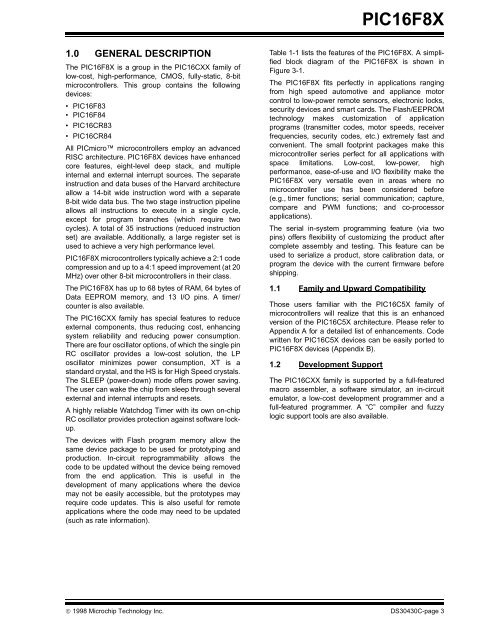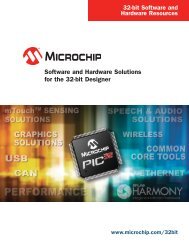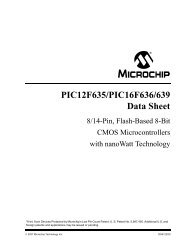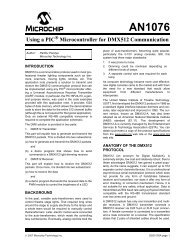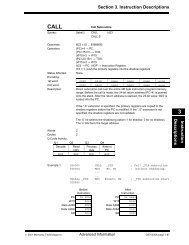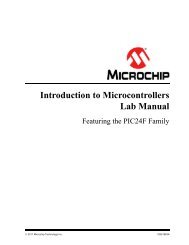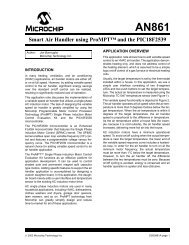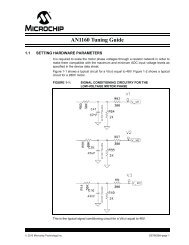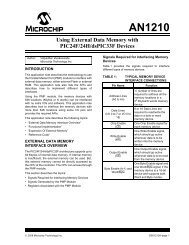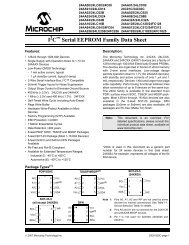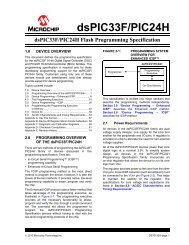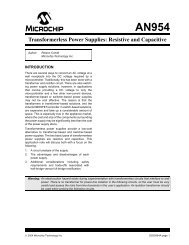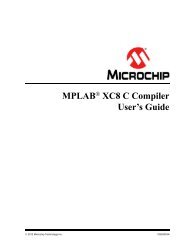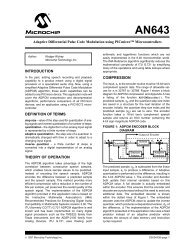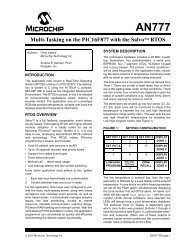PIC16F8X, 18-Pin FLASH/EEPROM 8-Bit MCU Data Sheet - Microchip
PIC16F8X, 18-Pin FLASH/EEPROM 8-Bit MCU Data Sheet - Microchip
PIC16F8X, 18-Pin FLASH/EEPROM 8-Bit MCU Data Sheet - Microchip
You also want an ePaper? Increase the reach of your titles
YUMPU automatically turns print PDFs into web optimized ePapers that Google loves.
1.0 GENERAL DESCRIPTION<br />
The <strong>PIC16F8X</strong> is a group in the PIC16CXX family of<br />
low-cost, high-performance, CMOS, fully-static, 8-bit<br />
microcontrollers. This group contains the following<br />
devices:<br />
• PIC16F83<br />
• PIC16F84<br />
• PIC16CR83<br />
• PIC16CR84<br />
All PICmicro microcontrollers employ an advanced<br />
RISC architecture. <strong>PIC16F8X</strong> devices have enhanced<br />
core features, eight-level deep stack, and multiple<br />
internal and external interrupt sources. The separate<br />
instruction and data buses of the Harvard architecture<br />
allow a 14-bit wide instruction word with a separate<br />
8-bit wide data bus. The two stage instruction pipeline<br />
allows all instructions to execute in a single cycle,<br />
except for program branches (which require two<br />
cycles). A total of 35 instructions (reduced instruction<br />
set) are available. Additionally, a large register set is<br />
used to achieve a very high performance level.<br />
<strong>PIC16F8X</strong> microcontrollers typically achieve a 2:1 code<br />
compression and up to a 4:1 speed improvement (at 20<br />
MHz) over other 8-bit microcontrollers in their class.<br />
The <strong>PIC16F8X</strong> has up to 68 bytes of RAM, 64 bytes of<br />
<strong>Data</strong> <strong>EEPROM</strong> memory, and 13 I/O pins. A timer/<br />
counter is also available.<br />
The PIC16CXX family has special features to reduce<br />
external components, thus reducing cost, enhancing<br />
system reliability and reducing power consumption.<br />
There are four oscillator options, of which the single pin<br />
RC oscillator provides a low-cost solution, the LP<br />
oscillator minimizes power consumption, XT is a<br />
standard crystal, and the HS is for High Speed crystals.<br />
The SLEEP (power-down) mode offers power saving.<br />
The user can wake the chip from sleep through several<br />
external and internal interrupts and resets.<br />
A highly reliable Watchdog Timer with its own on-chip<br />
RC oscillator provides protection against software lockup.<br />
The devices with Flash program memory allow the<br />
same device package to be used for prototyping and<br />
production. In-circuit reprogrammability allows the<br />
code to be updated without the device being removed<br />
from the end application. This is useful in the<br />
development of many applications where the device<br />
may not be easily accessible, but the prototypes may<br />
require code updates. This is also useful for remote<br />
applications where the code may need to be updated<br />
(such as rate information).<br />
<strong>PIC16F8X</strong><br />
Table 1-1 lists the features of the <strong>PIC16F8X</strong>. A simplified<br />
block diagram of the <strong>PIC16F8X</strong> is shown in<br />
Figure 3-1.<br />
The <strong>PIC16F8X</strong> fits perfectly in applications ranging<br />
from high speed automotive and appliance motor<br />
control to low-power remote sensors, electronic locks,<br />
security devices and smart cards. The Flash/<strong>EEPROM</strong><br />
technology makes customization of application<br />
programs (transmitter codes, motor speeds, receiver<br />
frequencies, security codes, etc.) extremely fast and<br />
convenient. The small footprint packages make this<br />
microcontroller series perfect for all applications with<br />
space limitations. Low-cost, low-power, high<br />
performance, ease-of-use and I/O flexibility make the<br />
<strong>PIC16F8X</strong> very versatile even in areas where no<br />
microcontroller use has been considered before<br />
(e.g., timer functions; serial communication; capture,<br />
compare and PWM functions; and co-processor<br />
applications).<br />
The serial in-system programming feature (via two<br />
pins) offers flexibility of customizing the product after<br />
complete assembly and testing. This feature can be<br />
used to serialize a product, store calibration data, or<br />
program the device with the current firmware before<br />
shipping.<br />
1.1 Family and Upward Compatibility<br />
Those users familiar with the PIC16C5X family of<br />
microcontrollers will realize that this is an enhanced<br />
version of the PIC16C5X architecture. Please refer to<br />
Appendix A for a detailed list of enhancements. Code<br />
written for PIC16C5X devices can be easily ported to<br />
<strong>PIC16F8X</strong> devices (Appendix B).<br />
1.2 Development Support<br />
The PIC16CXX family is supported by a full-featured<br />
macro assembler, a software simulator, an in-circuit<br />
emulator, a low-cost development programmer and a<br />
full-featured programmer. A “C” compiler and fuzzy<br />
logic support tools are also available.<br />
© 1998 <strong>Microchip</strong> Technology Inc. DS30430C-page 3


